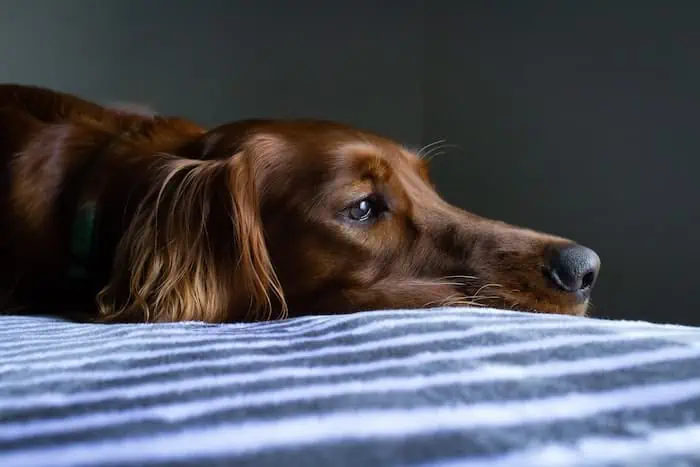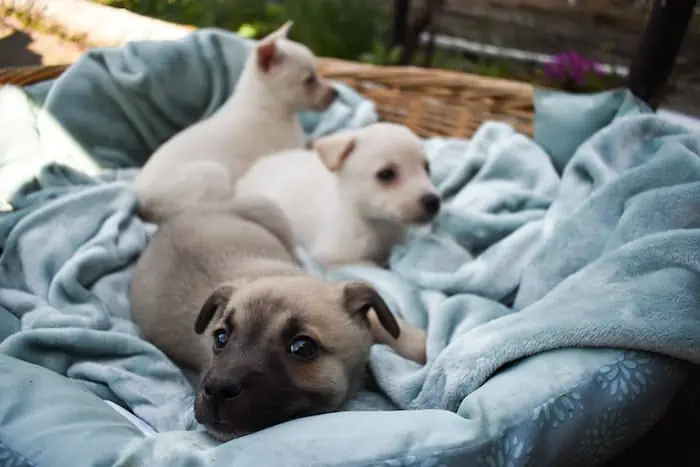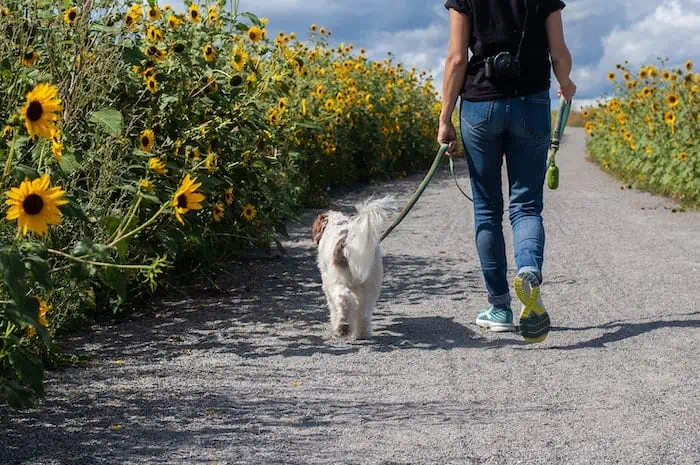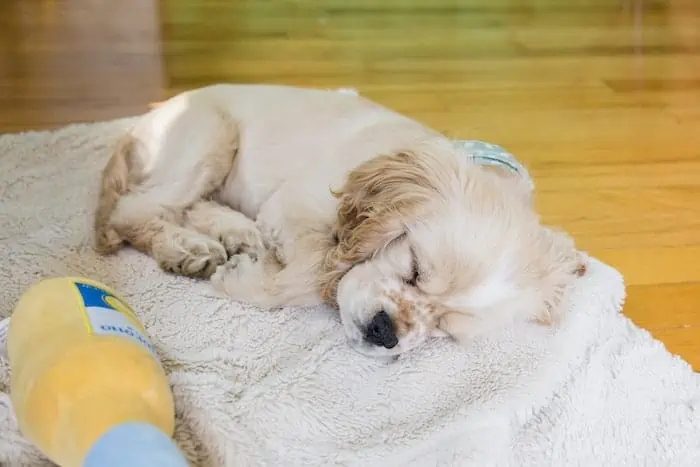Do Dogs Sleep in Their Own Poop? (10 Factors)
Dogs do not have an impulse to relieve themselves every time they go outdoors, so they will sometimes have accidents inside the home long after their pottying opportunity has passed. Similarly, dogs can usually sleep nearly anywhere they feel comfortable. But do dogs sleep in their own poop? Is it normal?
Although it certainly seems strange, it isn’t unusual for dogs to sometimes sleep in their own poop. However, it is never inherently normal for them to do so. Typically, age is the culprit because young puppies and old dogs mostly engage in this behavior for a variety of reasons. Besides age, though, the following factors may also contribute to dogs sleeping in their own poop:
- They like the smell
- Sickness
- Past history/experience with sleeping in their own poop
- Uncontrollable bowel movements
- Motherhood
- They are masking the smell of their own natural aroma
- Medical issues
- There isn’t much space to sleep
- Behavioral issues
Let’s discuss all these factors in detail.
10 Factors That Contribute to Dogs Sleeping in Their Own Poop
#1: Age
Normally, puppies and senior dogs do not have complete control of their sphincters, so it’s far more likely by comparison to other dogs that they may poop where they sleep or unintentionally end up sleeping where they poop.
For learning puppies and elderly dogs, this is simply to be expected in some cases. The average healthy adult dog should generally not have any problems associated with defecation in an area in which they usually sleep.
#2: They like the smell
This one may be difficult to comprehend, but it appears that dogs may genuinely like the scent of their own or other animals’ feces at times. Strangely, dogs may sleep in their poop due to the preference for familiarity.
Consider it in the same way people put on perfume: the stronger the aroma, the better it is for certain people. Dogs do not appear to be any different in this respect. While most dogs stick to rolling in dirt or trash to dirty themselves up for a good time, there are those canines that occasionally may find themselves sleeping in feces.
#3: Sickness

Another reason for canines to sleep in their own feces is sickness. Have you ever experienced diarrhea that was so severe that you couldn’t make it to the bathroom?
Think about it: you’re a dog who has to go outdoors, but no one is around to open the door for you. In that situation, you will end up pooping regardless of location if you’re unable to hold it. Most likely, this will end up being in a crate or in somewhere the dog feels comfortable, and this means it stands a pretty good chance of occurring in an area in which they sleep.
#4: Past history/experience with sleeping in their own poop
It is possible that in the past (before adopting your pet), your dog may have had the habit of sleeping in their own poop for one reason or another. To better understand this behavior, consider it similar to a child holding onto a familiar blanket or toy just as some puppies still do as well. Not only is it a learned habit, but carrying this scent with them offers a sense of comfort and familiarity. Your dog may be sleeping in his or her own poop as a way to return to that previous sensation of a familiar place or experience based on both scent as well as repeating the act of sleeping in feces. It may also be associated with trauma in some rescue dogs, functioning as an anxiety response as well as an unusual sort of coping mechanism.
#5: Uncontrollable bowel movements
Not being able to control their bowel movements is also a major reason this is true for both younger and senior canines because they are the dogs that are most likely to struggle with uncontrollable bowel movements. In the case of older canines, age is the major contributing factor that causes them to have difficulties with controlling their bowel movements. Similarly, when young puppies struggle to regulate control over their organs and potty training habits, they may end up just pooping where they want, and this means that they will sometimes poop where they sleep.
Occasionally, uncontrollable bowel movements may occur in other dogs of different ages due to health-related issues, stress, or other conditions.
#6: Motherhood

Sometimes, mother dogs can become very protective and will not leave their young pups alone, even if this means they’ll have to sleep in their puppies’ poop. This is not the case with all mother dogs, but some canine moms will display this behavior, so it shouldn’t cause significant concern if your own dog has just had puppies and you find her sleeping in feces.
#7: They are masking the smell of their own natural aroma
Occasionally, dogs will try to hide their identities. Normally, concealing their identities will provide them with a tactical edge in situations that might occur in the wild, yet domesticated dogs will often still replicate this behavior and displays these natural instincts.
So, to hide their scent, they may sleep in the same area where they poop. This throws off the typical way in which dogs will mark and check for certain scents, similarly to how dogs will roll or otherwise cover themselves in what we humans deem to be disgusting smells.
#8: Medical issues
Dogs might unknowingly or unintentionally relieve themselves due to certain medical conditions or other related problems. Conditions that can lead to unintended peeing or pooping in a dog may be bacterial, viral, or any numer of other diseases. However, if your dog is in the adult age range and otherwise healthy, uncontrollable bathroom activities are a cause for concern and should be brought to your veterinarian’s attention immediately. Any medical issue that causes unintentional and unexpected defecation can cause your dog to end up sleeping in their own feces.
If you suspect that your pooch is suffering from a medical condition that is causing him or her to defecate or pee on their dog bed, any bedding surrounding it, or a place in the home where they commonly sleep or rest, be sure to consult your veterinarian immediately.
#9: There isn’t much space to sleep
There should never be justification for dogs to lie in their own feces, but regrettably, this is a common occurrence in puppy mills. As a result of their cramped accommodations and lack of opportunities to empty themselves, pups will have no choice but to defecate in their sleeping quarters. Being raised in such an environment may also contribute to them learning to sleep in their feces and develop a habit that will carry with them to their new home, as addressed above.
#10: Behavioral issues
Another cause for a dog to defecate in his or her canine bed or sleeping space is that the dog is experiencing behavioral troubles. These behaviors are frequent in dogs or puppies that seek to “punish” their owners for something, such as not providing enough playtime, keeping them in the house too long, or welcoming another family member into the home (either a pet or baby).
These dogs express their displeasure by willfully disobeying the known rule of pottying outdoors, but making changes within the home or seeking the help and advice of a trained canine behavioral therapist can help alleviate these issues and resolve your dog’s defiance and unhygienic revenge behaviors.
What Should You Do If Your Dog Sleeps in His or Her Own Poop?: The Solutions
More outdoor time

Potty training your pet is no longer an option if he or she is pooping where he or she sleeps and is unable to control it. When this is the case, you will need to take your dog outside considerably more frequently, particularly before sleeping at night and at least a few times during the night as well.
As a puppy grows older and matures, the desire to relieve himself or herself will lessen significantly as they gain more control over their bodily functions. For dogs in which a medical condition associated with old age or the body’s natural aging process is to blame, you may need to stick with these frequent sleeptime outings for the sake of preventing further accidents as your dog’s bodily control lessens and weakens in their old age.
Hire a dog sitter or walker
Investing in a dog sitter or dog walker may be wise for dog owners who work during the day and are unable to provide enough time, attention, and outings for their dogs.
Depending on your particular needs, this type of individual can come to your home to take your puppy, adult, or even elderly dog outside, reducing the frequency of finding them sleeping in their own dog poop.
Invest in doggy pee pads
Using dog pee pads as an alternative to having someone take your dog outdoors is also a good idea. With this method, the poop (and even any pee) should hopefully be confined to a single location.
In many cases, dogs will defecate on one side of a pee pad and then use their noses to cover it with the other side. This also reduces the occurrences of a dog sleeping in its own poop.
Talk to your veterinarian
Make sure to consult with your veterinary doctor first to check that your dog is healthy and can handle the situation by either providing more alternatives for your dog to empty him or herself or using pee pads to contain the situation. In some cases, such as those related to medical conditions, your vet may also be able to provide certain medications or other therapies to help resolve the situation.
FAQs
What might possibly cause my dog to poop in his sleep?

First and foremost, it’s crucial to understand that your dog is not pooping in his sleep on purpose. It’s practically the same as a youngster peeing in his or her bed while asleep. Would you punish them or reprimand them? Without a doubt, this is not the case! It would be understandable that they were sleeping and had no control over their actions especially in the presence of certain health conditions.
If your canine companion passes a completely formed stool while sleeping, they may be suffering from sphincter incontinence. Located near the outflow of the anus, the anal sphincter is a round muscle that contracts and relaxes to control defecation. It remains closed until it is time to empty the feces during daily bathroom activities when it relaxes, allowing the anus to expand and enable the excrement to pass.
Sphincter incontinence is a condition in which the sphincter muscle is unable to contract adequately. When the muscle is unable to contract, it is unable to adequately retain the feces in place. Poop will slide out of the dog’s backside frequently without the dog even being aware of it.
Sphincter incontinence is a condition that can develop due to growing older, and it isn’t particularly unusual. As a dog ages, its sphincter muscle may become less effective, causing the “sleeping in their own poop” situation to occur.
Additionally, pooping in one’s sleep is also common in young puppies. Puppies younger than two weeks of age are unable to control their bodies just yet, so accidental defecation is relatively common.
What is the difference between sphincter incontinence and reservoir Incontinence?
If your dog suffers from sphincter incontinence, you will find solid poop chunks in his or her passed feces. These might be log-like pieces or fecal balls of various sizes.
On the other hand, anal leakage or soft watery feces are frequent symptoms of reservoir incontinence. When sleeping, your dog may leak little amounts of poop or cover the sleeping area with soft poop or liquids from their backside.
Do both male and female dogs get affected by urinary incontinence?
Yes. Both male and female canines can be affected by urinary incontinence. Urinary incontinence in male canines is rare, but it is more frequent in neutered males. On the other hand, a few drops of unintentional urination are common among female dogs when they sleep, usually being enough to dampen their fur but not enough to wet their bedding. It may not be enough pee to cause you any inconvenience, but it is enough to put your dog at risk for urinary tract infections in the future.
What causes elderly dogs to defecate in their sleep more frequently?
It is possible that such dogs are unable to completely empty their intestines when they are out in the yard owing to discomfort, and as a result, they end up excreting balls of feces when their muscles relax while sleeping.
Additionally, senior dogs are more likely to suffer from age-related nerve degeneration than younger canines, leading to lesser nerve control on the sphincter muscle, resulting in uncontrol pooping.
See Also:
How Long Can a Dog Hold its Pee?
9 Reasons Why Your Dog Keeps Covering Her Puppies
6 Reasons Why Dogs Are So Greedy
Why Would Dog Poop Be Cold? (A Detailed Explanation)
How Long Can a Dog Hold Its Poop?

Family Dog Expert Author
Hi there! I’m Stuart, a devoted dog lover and family dog expert with over a decade of experience working with our furry companions. My passion for dogs drives me to share my knowledge and expertise, helping families build strong, loving bonds with their four-legged friends. When I’m not writing for SirDoggie, you’ll find me hiking, playing with my beautiful dog, or studying music.
